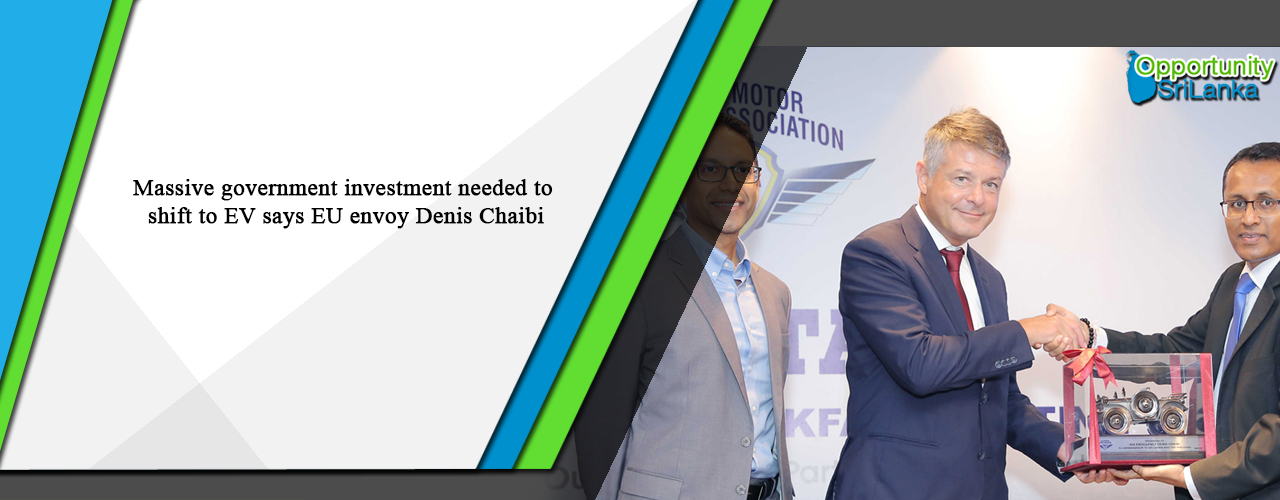Massive government investment needed to shift to EV says EU envoy Denis Chaibi
Ada Derana: The Ceylon Motor Traders Association (CMTA), the senior most automotive association in Sri Lanka, recently held another CMTA Stakeholder Breakfast Forum at the Hilton Colombo Residencies. The event was graced by His Excellency Denis Chaibi, the EU Ambassador to Sri Lanka and the Maldives as the guest speaker. Several other Officials from Ministries, Government institutions and other stakeholder organizations of the Motor industry were also present at the forum.
Charaka Perera, Chairman of the Ceylon Motor Traders Association addressed the gathering and highlighted a host of topics such as the hardships faced by the motor industry, the structured proposal by CMTA to lift the suspension on vehicle imports, Electric Vehicles (EV), and more. During his address, Perera said, “While some of the countries who have also agreed to COP26 targets have far better EV infra-structure than Sri Lanka, none of them have set their targets for 100% passenger EVs for the immediate term. This indicates that all of them understand the impracticality of achieving 100% passenger EVs even within a span of five years”.
His Excellency Denis Chaibi, the EU Ambassador to Sri Lanka and the Maldives then addressed the forum on topics such as the role of the automobile industry in Europe, the relationship between governments and the automobile industry, the infrastructure required for electric vehicles and more.
During his address His Excellency, Chaibi said, “The biggest challenge for EVs is the massive investment required for the grid to be able to receive and redistribute renewable energy and to be able to support charging stations. It would take massive investments or public expenditure for the infrastructure for recharging sites for electric vehicles. The best recharging stations take about 20 minutes to charge a vehicle to 80%, so even if you have a large recharging station with say 20 charging points, it will take 20 cars, for 20 minutes. In terms of electric cars in Sri Lanka, we must look at regulation, enforcement, profit for both manufacturer and the state, and infrastructure.”
Chaibi then engaged the audience in a Q&A session, during which he noted. “In Sri Lanka, you come up with a long-term vision that bears in mind the constraints you face. Sri Lanka will not have the finances to invest in grid infrastructure overnight, it needs to have a sequenced approach in terms of the infrastructure needed, and how the gaps need to be filled, and a set timeline. Finding more sources of renewable energy should be feasible, as Sri Lanka is blessed with mountains, rains, wind, sun, and tides, and with an investment of 15 to 20 billion dollars could be carbon neutral in a few years.”
OSL take:
Sri Lanka has adopted a policy of promoting electric vehicles (EVs) as part of the country’s sustainability programmed. The Sri Lankan government has offered incentive schemes to manufactures of EVs locally and has also permitted Sri Lankan expatriates to purchase EVs from overseas and send to Sri Lanka. The expanding economic activities in the country have increased the demand for environmentally-friendly and sustainable transport methods. Apart from the growing opportunities in the supply of EVs to Sri Lanka, there’s a growing demand for the setting up of the required infrastructure facilities like charging stations, etc., along with the increase in the use of EVs. Foreign businesses/investors could explore the growing business/investment opportunities in Sri Lanka’s drive to promote EVs. Foreign businesses could also look at partnering with local businesses in the manufacture of vehicles and look at manufacturing EVs suited for the local market.
| Article Code : | VBS/AT/20231016/Z_8 |

